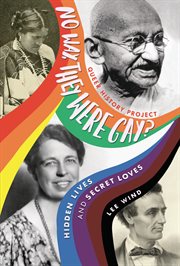Details
PUBLISHED
Made available through hoopla
DESCRIPTION
1 online resource
ISBN/ISSN
LANGUAGE
NOTES
"History" sounds really official. Like it's all fact. Like it's definitely what happened. But that's not necessarily true. History was crafted by the people who recorded it. And sometimes, those historians were biased against, didn't see, or couldn't even imagine anyone different from themselves. That means that history has often left out the stories of LGBTQIA+ people: men who loved men, women who loved women, people who loved without regard to gender, and people who lived outside gender boundaries. Historians have even censored the lives and loves of some of the world's most famous people, from William Shakespeare and Pharaoh Hatshepsut to Cary Grant and Eleanor Roosevelt. Join author Lee Wind for this fascinating journey through primary sources-poetry, memoir, news clippings, and images of ancient artwork-to explore the hidden (and often surprising) Queer lives and loves of two dozen historical figures. "People can't see what isn't culturally visible-that's why queer history is so necessary, not just as a one-off, but as a perennial part of a culture's story. In No Way, They Were Gay?, Lee Wind revisits famous figures of US and world history, delves into primary sources, and reassesses what's made legible about people's sexual and gender identities when the present and past are allowed to collide. The book is divided into three categories: men who loved men, women who loved women, and people who lived outside of gender binaries. Wind provides one of the best explanations for the necessity of these expansive categories: while his system acknowledges the problems of applying modern terms to the past, it also encodes the complexity of human experience around gender and sexuality in ways that create continuity with the present, and that reverse queer historical erasure. From Gandhi to Eleanor Roosevelt, Wind doesn't shy away from revealing his subjects in their full complexity. A fellow traveler and guide on a journey of discovery, Wind calls out the shadow sides of those profiled, as well as what's laudable. His book transmits rare facts and firsthand accounts with a sense of joyous wonder. It also encourages readers to come to their own conclusions about the facts provided. Each chapter closes with some iteration of the question, 'What do you think?' Even in regards to his own book, Wind emphasizes that history is an interpretative place that requires critical thinking. At a time where issues of social justice are often deemed either overinflated or 'solved,' Lee Wind makes a powerful case that queer historical erasure is an ongoing issue."-Foreword Reviews "A lighthearted celebration of select LGBTQ+ individuals throughout history. 'History was crafted by the people who recorded it,' writes Wind as he endeavors to 'reclaim the queer history' of 12 individuals (and, tangentially, about a dozen more). Wind's spotlight shines on those whose stories he deems 'earth-shaking surprises,' ranging from Pharaoh Hatshepsut (1495-1458 B.C.E.) to Lesotho storyteller M'e Mpho Nthunya (1930-2013). Chapters provide helpful historical context before diving into the figures' lives-and, importantly, loves. Throughout, Wind is careful to use correct or historically accurate pronouns (or, in the case of uncertainty, the singular they). Deftly weaving in primary sources (in bold text), cheeky sidebars, and his own narrative observations as a gay man, Wind keeps the tone conversational and playful. Open-ended questions allow readers to draw their own conclusions-a particularly nice touch for those histories that rely on speculative details. Though Wind is upfront about some racist or problematic attitudes, his rosy picture of Abraham Lincoln makes for an inconsistent treatment. Nonetheless, the careful (though not comprehensive) selection of figures achieves a rare sense of balance. The three overarching categories-'Men Who Loved Men,' 'Women Who Loved Women,' an
Mode of access: World Wide Web







